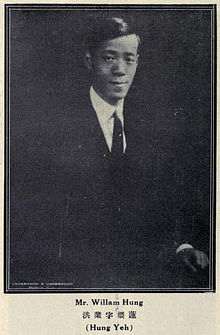William Hung | |||||||||||||
|---|---|---|---|---|---|---|---|---|---|---|---|---|---|
洪業 | |||||||||||||
 | |||||||||||||
| Born | October 27, 1893 | ||||||||||||
| Died | December 22, 1980 (aged 87) Cambridge, Massachusetts, United States | ||||||||||||
| Nationality | Chinese | ||||||||||||
| Alma mater | Ohio Wesleyan University | ||||||||||||
| Known for | Harvard Yenching Index Series; Tu Fu: China's Greatest Poet | ||||||||||||
| Spouse | Rhoda Kong | ||||||||||||
| Children | 3 | ||||||||||||
| Awards | Prix Stanislas Julien | ||||||||||||
| Scientific career | |||||||||||||
| Fields | Classical Chinese, Chinese literature, Sinology | ||||||||||||
| Institutions | Yenching University Harvard University | ||||||||||||
| Notable students | David Nivison, Teng Ssu-yu, Francis Cleaves | ||||||||||||
| Chinese name | |||||||||||||
| Traditional Chinese | 洪業 | ||||||||||||
| Simplified Chinese | 洪业 | ||||||||||||
| |||||||||||||
William Hung (Chinese: 洪業; October 27, 1893 – December 22, 1980), was a Chinese historian and sinologist who taught for many years at Yenching University, Peking, which was China's leading Christian university, and at Harvard University. He is known for bringing modern standards of scholarship to the study of Chinese classical writings, for editing the Harvard-Yenching Index Series, and for his biography of Du Fu, Tu Fu: China's Greatest Poet, which is considered a classic in the English world on the studies of Du Fu.[1] He became a Christian while a student at the Anglo-Chinese College in Fuzhou, then went to Ohio Wesleyan University, Delaware, Ohio, Columbia University, and Union Theological Seminary. On his return to China, he became Professor and Dean of Yenching University, where he was instrumental in establishing the Harvard-Yenching Institute.[2] He came to Harvard in 1946 and spent the rest of his life in Cambridge, Massachusetts, teaching and mentoring students.
William Hung was the oldest of six children. His father gave him the "school name" Hong Ye ("Great Enterprise"), and then when he left for the United States he took the given name William. He married Rhoda Kong in 1919, and the couple had three children, Ruth, Gertrude, and Agnes.